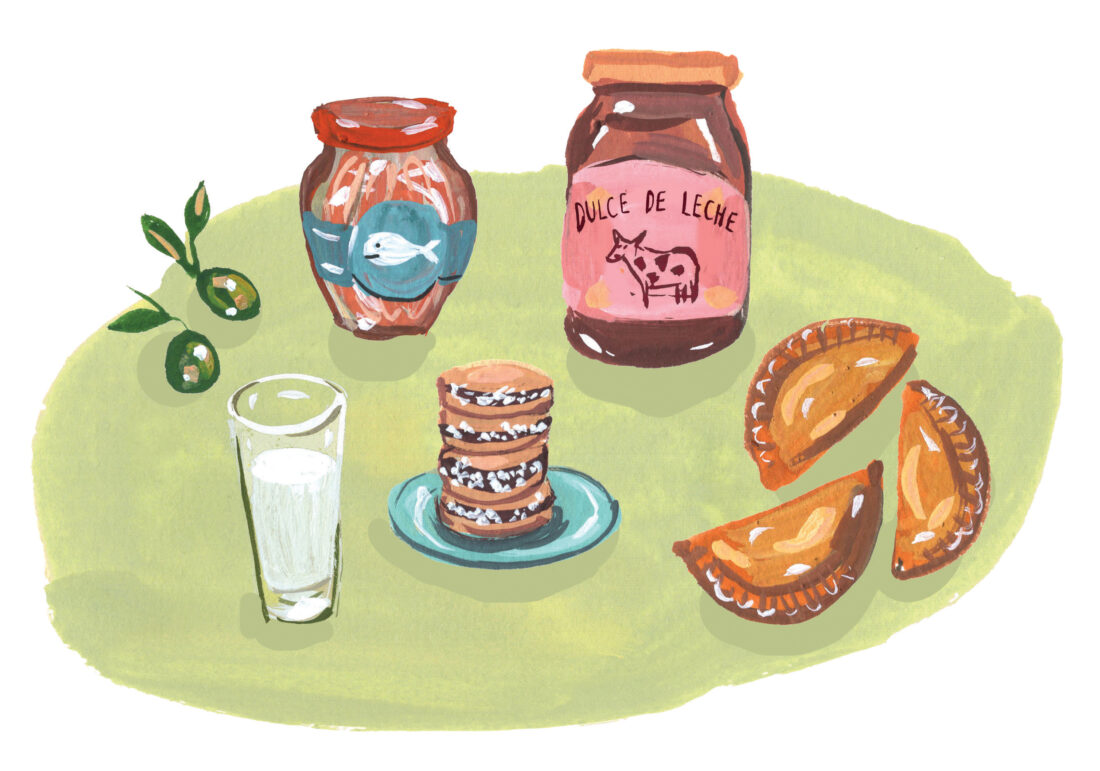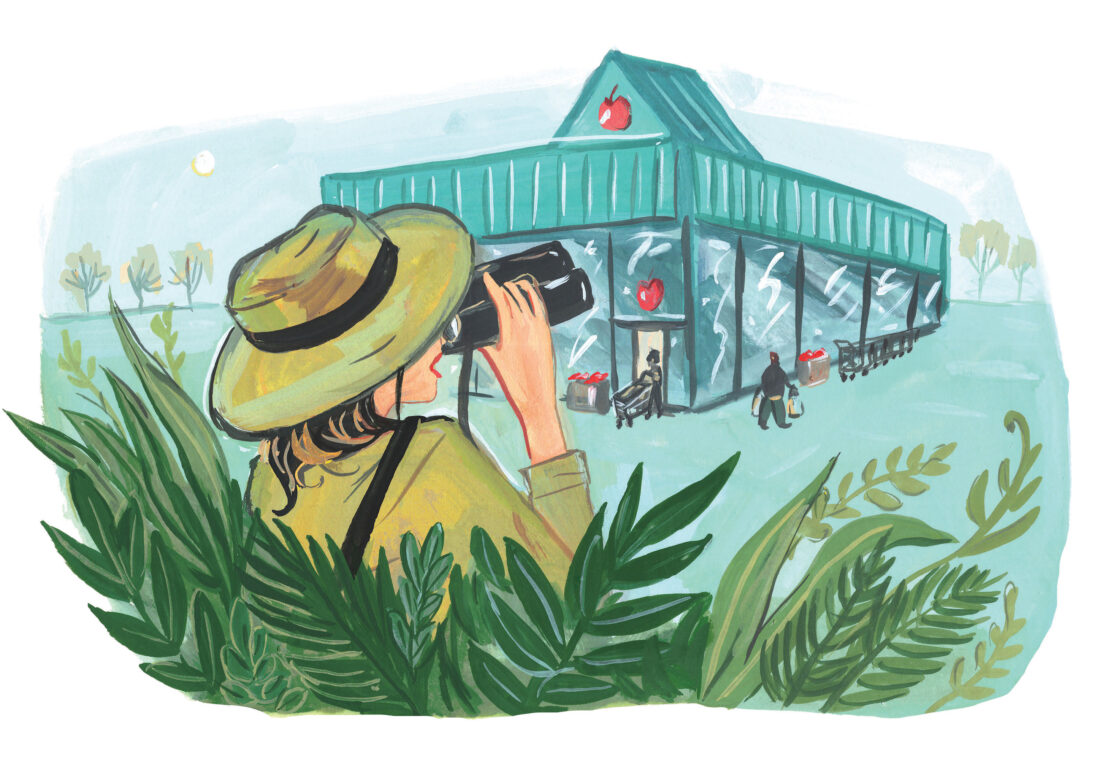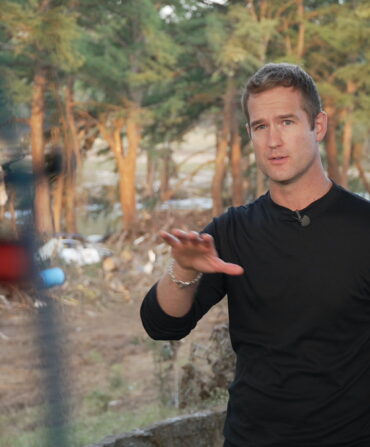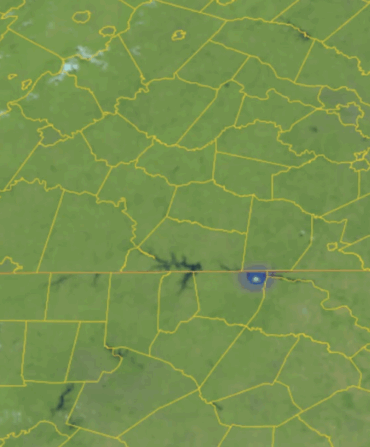Last year, my son had to write a poem about me for Mother’s Day. My kids have been dealt an assignment like this before, so I braced myself for the sure-to-be-eye-opening experience of reading his unvarnished thoughts regarding my private life. The observations both he and his sister had made about me in the past highlighted things I didn’t even know about myself. This new work of art proved no different.

The stanza “My mom goes to the grocery store every day / It doesn’t matter if we need anything, she always finds a way” couldn’t be more accurate. But what Theo fails to mention is that I actually hate going to the grocery store for all the mundane things—broccoli, cat food, toilet paper, milk, eggs. As with any task I dread, I often arrive to it ill prepared. Then, once I’m behind the cart and it feels like Groundhog Day (wasn’t I just here?), I rush through the aisles as if I’m on a game show. That, my Theo, is how I find myself having to return daily to Food Lion, Piggly Wiggly, or Walmart for items I’ve forgotten.
Like any true poet’s, though, Theo’s words hold meaning on multiple levels. Because while I do tend to view trips to my local supermarket as a burdensome chore, I embrace the chance to mosey through a grocery store just about anywhere else I visit. It’s the best way to experience the essence of a place—if you’re ever in Hawaii, for instance, and you don’t go to gaze and graze upon the poke bar the supermarkets there offer in lieu of a deli, you’re really missing out.
I would like to credit my innate anthropological curiosity for leading me to this type of tourism, but I think I can instead trace it back to my longtime fear of looking like a tourist. A fanny pack, visor, and selfie stick would strip away all my self-respect. And even though the rural chip on my shoulder has eroded over time, when I envision myself clutching a YOU ARE HERE map like a country mouse or when I open my mouth in an unfamiliar place and my accent escapes, my confidence leaks away. I grew up watching TV shows like The Beverly Hillbillies and Hee Haw, both of which poked fun at rural folks with exaggerated, high-pitched twangs and clothes from the nineteenth century. Aware of my own ruralness, dripping in props that scream “she ain’t from around here,” and with a question to ask, I fear I’d be paralyzed bait for pickpockets on the Paris Métro and just plain easy fodder for haters everywhere. No, thank you. I choose to pretend I’m a local instead.
This approach eliminates many traditional trip options, particularly when you have kids. You would literally have to pay me to board a cruise ship or go to an amusement park, corralled into lines, surrounded by water or walls, everybody in a uniform or a wristband. And so while my children may lament that they’ve never been to Disney World or the Great Wolf Lodge, they have spent two weeks in Massa Lubrense, Italy.
Few tourists seek out that small town tucked near Sorrento and the Amalfi Coast, but many of the people who work in the hotels and restaurants to its north and south call it home. And for a stint several summers ago, I carried on in Massa Lubrense as if I lived there too. Every day, except for the ones when I did the most low-key touristy things my expat guide could conjure, I putzed around the town square and patronized the local butcher, baker, fishmonger, and pasta maker until my heart swelled like a full-blown Italian’s. I didn’t talk much, preferring to use pointing and credit cards to communicate. I wasn’t fooling anyone into thinking I was from Massa Lubrense. But it was enough to make me happy on vacation.

My determination to act like a local and therefore shop like one began when I spent a summer in New York City for an internship at CBS’s Sunday Morning. I lived at 113th and Broadway, a neighborhood full of Columbia students, professors, and other people who looked like they had a real reason to be there. In theory, I temporarily belonged there, too, so I followed their lead, eating giant slices of pizza at Koronet, nibbling on pastries from what was then Nussbaum & Wu, and always taking the subway. I did my laundry down the street, and I shopped for food at Westside Market. Of all my memories of that summer, the one that resonates the most, the one I’d love to return to, is of a Sunday afternoon trip there to fetch rotisserie chicken, salad fixings, and dinner rolls plucked from a bin. On the walk home, I knew I was hooked on New York. But I didn’t yet know I’d also fallen in love with the grocery store.
A couple of years later, I studied abroad in Buenos Aires. Most study-abroad stories are full of butterflies and rainbows. Mine, not so much: I was in a car accident my first week there, which greatly affected the quality of the remaining six months in Argentina. I survived, obviously, but because of my lack of language skills, an inhospitable homestay, and my questionable mental health, I searched for solace on the streets of Recoleta—the posh neighborhood where I slept in a woman’s office on her pullout couch—and eventually found it inside a grocery store just down the hill and around the corner called El Almacén.
The well-lit, well-marked, and properly chilled expanse overflowed with all the things I loved most about Argentina. And it felt safe, because I didn’t have to ask anyone about the items. I only had to endure one awkward interaction at checkout, and then I could douse myself in the comforts of dulce de leche, empanadas, tuna packed in olive oil, and cookies called alfajores dunked in milk the store alarmingly only offered at room temperature in a carton.
More than twenty years later, my affinity for tourism-by-grocery has only deepened. After all, I often see firsthand the evidence that supermarkets can offer a bird’s-eye view—and a literal taste—of the communities they serve, every time I begrudgingly stop at the Piggly Wiggly in Kinston for laundry detergent. Where else, other than a Pig in Eastern North Carolina, would you find an entire aisle of dried corn products, a wall cooler designated for seasoning meat, and produce bins dominated by cabbage collards, muscadine grapes, and green peanuts? And sometimes, grocery stores can bring a culture to you. As a woman who lives in the middle of nowhere, to experience and peruse exotic ingredients on a regular basis, I simply head to H Mart and Bharath Bazar in Cary, with a side of Wegmans and Trader Joe’s in Raleigh. No passport required.








